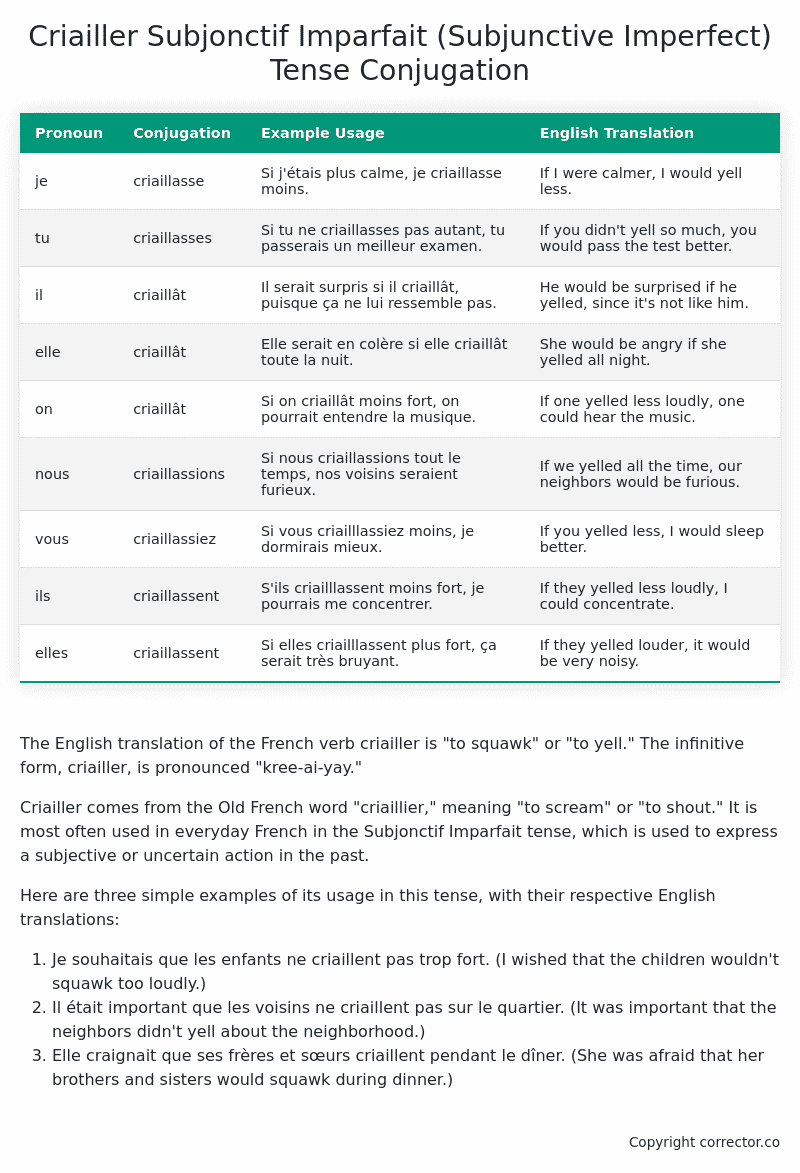Subjonctif Imparfait (Subjunctive Imperfect) Tense Conjugation of the French Verb criailler
Introduction to the verb criailler
The English translation of the French verb criailler is “to squawk” or “to yell.” The infinitive form, criailler, is pronounced “kree-ai-yay.”
Criailler comes from the Old French word “criaillier,” meaning “to scream” or “to shout.” It is most often used in everyday French in the Subjonctif Imparfait tense, which is used to express a subjective or uncertain action in the past.
Here are three simple examples of its usage in this tense, with their respective English translations:
- Je souhaitais que les enfants ne criaillent pas trop fort. (I wished that the children wouldn’t squawk too loudly.)
- Il était important que les voisins ne criaillent pas sur le quartier. (It was important that the neighbors didn’t yell about the neighborhood.)
- Elle craignait que ses frères et sœurs criaillent pendant le dîner. (She was afraid that her brothers and sisters would squawk during dinner.)
Table of the Subjonctif Imparfait (Subjunctive Imperfect) Tense Conjugation of criailler
| Pronoun | Conjugation | Example Usage | English Translation |
|---|---|---|---|
| je | criaillasse | Si j’étais plus calme, je criaillasse moins. | If I were calmer, I would yell less. |
| tu | criaillasses | Si tu ne criaillasses pas autant, tu passerais un meilleur examen. | If you didn’t yell so much, you would pass the test better. |
| il | criaillât | Il serait surpris si il criaillât, puisque ça ne lui ressemble pas. | He would be surprised if he yelled, since it’s not like him. |
| elle | criaillât | Elle serait en colère si elle criaillât toute la nuit. | She would be angry if she yelled all night. |
| on | criaillât | Si on criaillât moins fort, on pourrait entendre la musique. | If one yelled less loudly, one could hear the music. |
| nous | criaillassions | Si nous criaillassions tout le temps, nos voisins seraient furieux. | If we yelled all the time, our neighbors would be furious. |
| vous | criaillassiez | Si vous criailllassiez moins, je dormirais mieux. | If you yelled less, I would sleep better. |
| ils | criaillassent | S’ils criailllassent moins fort, je pourrais me concentrer. | If they yelled less loudly, I could concentrate. |
| elles | criaillassent | Si elles criailllassent plus fort, ça serait très bruyant. | If they yelled louder, it would be very noisy. |
Other Conjugations for Criailler.
Le Present (Present Tense) Conjugation of the French Verb criailler
Imparfait (Imperfect) Tense Conjugation of the French Verb criailler
Passé Simple (Simple Past) Tense Conjugation of the French Verb criailler
Passé Composé (Present Perfect) Tense Conjugation of the French Verb criailler
Futur Simple (Simple Future) Tense Conjugation of the French Verb criailler
Futur Proche (Near Future) Tense Conjugation of the French Verb criailler
Plus-que-parfait (Pluperfect) Tense Conjugation of the French Verb criailler
Passé Antérieur (Past Anterior) Tense Conjugation of the French Verb criailler
Futur Antérieur (Future Anterior) Tense Conjugation of the French Verb criailler
Subjonctif Présent (Subjunctive Present) Tense Conjugation of the French Verb criailler
Subjonctif Passé (Subjunctive Past) Tense Conjugation of the French Verb criailler
Subjonctif Imparfait (Subjunctive Imperfect) Tense Conjugation of the French Verb criailler (this article)
Subjonctif Plus-que-parfait (Subjunctive Pluperfect) Tense Conjugation of the French Verb criailler
Conditionnel Présent (Conditional Present) Tense Conjugation of the French Verb criailler
Conditionnel Passé (Conditional Past) Tense Conjugation of the French Verb criailler
L’impératif Présent (Imperative Present) Tense Conjugation of the French Verb criailler
L’infinitif Présent (Infinitive Present) Tense Conjugation of the French Verb criailler
Struggling with French verbs or the language in general? Why not use our free French Grammar Checker – no registration required!
Get a FREE Download Study Sheet of this Conjugation 🔥
Simply right click the image below, click “save image” and get your free reference for the criailler Subjonctif Imparfait tense conjugation!

Criailler – About the French Subjonctif Imparfait (Subjunctive Imperfect) Tense
Formation
Common Everyday Usage Patterns
Interactions with Other Tenses
Subjonctif Présent
Indicatif Passé Composé
Conditional
Conditional Perfect
Summary
I hope you enjoyed this article on the verb criailler. Still in a learning mood? Check out another TOTALLY random French verb conjugation!


